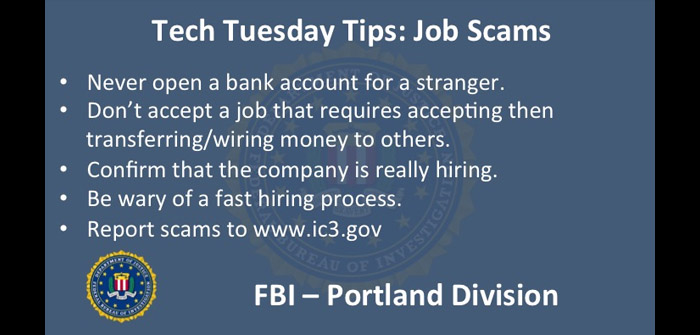Maybe you are a federal employee who was desperate to pay the bills during the recent shutdown — or you just really need to pay off those Christmas debts. Either way, we are getting more and more reports this month of people looking for jobs who are getting scammed.
In particular, we are hearing accounts of people who find jobs listed on social media platforms and end up losing money. Here’s how it can start:
You are browsing through your favorite social media platform and land in a group post for your area. Maybe the group uses your city’s name with the words “now hiring” or the like. You find a job that fits your skills and pays decently. You shoot off a message through the platform or an email to the employer. After a bit of back and forth, you agree on a salary and schedule.
In another twist on this scam, you sign up for one of the big, very recognizable online employment sites. You start to get job offers that appear to come from that site – but in reality the bad guy is spoofing the look of the offer to make himself appear legitimate.
In both cases, the person interviewing or offering you a job may start to ask for information such as your date of birth, address and Social Security number – personally identifiable information that can be used to open fraudulent bank accounts, take out loans and obtain credit cards.
The scam artist might also send you a signing bonus, first paycheck or funds to buy equipment for your work-at-home office. The bad guy tells you to cash the check, take a bit out for yourself and send the rest to a specified vendor for supplies or needed software. The check, of course, is bogus, and the fraudster actually controls the bank account of what you thought was a legitimate business vendor.
In the end, your bank may close your account due to the fraudulent activity, and you are now responsible for reimbursing that bank for the counterfeit check. Your credit history may take a hit, too.
So how to protect yourself?
- Never open a bank account for use by strangers.
- Don’t accept a job that requires accepting money then wiring portions of checks to other individuals or accounts.
- Look for poor use of the English language in messages, including the incorrect use of grammar, capitalization, and verb tenses.
- Confirm that the company that you are dealing with really is hiring. Call the company using a publicly-available number — such as one off its website – – to confirm that the offer is legitimate, and
- Be wary of an exceptionally-fast hiring process
How do businesses protect themselves?
- Make sure your website and social media accounts specify how your hiring process works, and
- Be very clear about the fact that you would not hire people in the ways described above.
If you have been victimized by an online scam, report your suspicious contacts to the FBI. You can file an online report at the FBI’s Internet Crime Complaint Center at www.ic3.gov or call your FBI local office.




